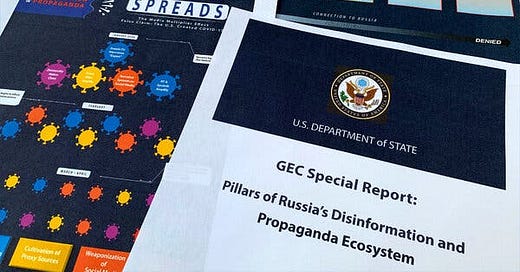America Left Defenseless
The first casualty of the incoming Trump regime is America’s defense against disinformation—the Global Engagement Center (GEC). With its closure on December 23, the United States stands defenseless as Russia, China, and Iran continue their relentless and increasingly successful operations to divide and destabilize America. This dangerous move not only signals a surrender in the battle against foreign influence but also highlights how Republicans have capitalized on and amplified disinformation to their political advantage, all while dismantling mechanisms designed to monitor and counter these threats.
Adding to the assault, President-elect Elon Musk, a vocal critic of the GEC, launched repeated attacks on the center last week, accusing it of censorship and further fueling the narrative that undermined its mission. Meanwhile, platforms like X have, by design, become a key battleground, where Russian disinformation is rampantly spread and amplified.
The GEC's fate was sealed after Musk publicly attacked the agency, fueling a campaign to discredit it which, ultimately, led to the removal of its $61 million annual funding from the federal spending bill passed last week.
In a stream of posts on X, Musk assailed the federal spending bill on various points, calling it “criminal” for including funding for the State Department’s Global Engagement Center. Musk slammed the GEC, an agency tasked with fighting foreign propaganda and disinformation, referring to it as a “censorship operation.”
Shockingly, the shutdown went largely unreported by major media outlets, underscoring the complete failure of the press to address a critical moment in America’s defense against foreign disinformation.
The Origins and Role of the GEC
Established in 2016 under the Obama administration, the GEC was a critical arm of the State Department tasked with identifying and countering disinformation campaigns orchestrated by foreign adversaries—Russia, China, Iran, etc. Over the years, its work became increasingly vital as malign actors exploited social media, manipulated narratives, and deployed propaganda to sow discord and weaken democratic institutions.
By defunding the GEC, Republicans have handed a victory to Russia, China, and Iran, ensuring that their disinformation campaigns will proceed unchecked.
The Global Engagement Center (GEC) traces its origins to 2011, when Executive Order 13584 established the Center for Strategic Counterterrorism Communications (CSCC) within the Department of State to support government-wide public communications efforts targeting violent extremism and terrorist organizations. In 2016, Executive Order 13721 transformed the CSCC into the GEC, maintaining its counterterrorism mission while broadening its scope. This expansion was further solidified with the National Defense Authorization Act for Fiscal Year 2017, which granted the GEC authority to address propaganda and disinformation activities by foreign and non-state actors. The John S. McCain National Defense Authorization Act for Fiscal Year 2019 refined the center’s mission, providing it with a clear mandate as reflected in its mission statement.
Political Attacks and Defunding
Over the past decade, Republicans have not only exploited Russian disinformation for political gain but, in many cases, have actively coordinated with or amplified Moscow's disinformation operations to further their agendas. Key Republican figures have spread false narratives aligning with Russian strategic objectives, intentionally undermining public trust in democratic institutions and the electoral process.
In a systematic effort, Republicans have relentlessly attacked any agency, institute, or university working to combat disinformation, turning these institutions into targets of partisan hostility. The Global Engagement Center (GEC), along with other counter-disinformation initiatives, has been ruthlessly discredited and attacked by Republican lawmakers, further destabilizing the U.S. while emboldening foreign adversaries.
Russian intelligence exploits First Amendment protections as a loophole to run disinformation operations, knowing free speech acts as a shield—an argument Republicans have echoed in opposition to counter-disinformation efforts.
In 2023, Texas Attorney General Ken Paxton and two conservative digital outlets filed a lawsuit against the State Department filled with disinformation, alleging the GEC’s activities represented “one of the most egregious government operations to censor the American press.”
The latest closure follows years of intense Republican-led backlash, culminating in the disbanding of the Department of Homeland Security's (DHS) Disinformation Governance Board in 2022. Similarly, the Stanford Internet Observatory, a key institution in researching misinformation, experienced significant setbacks due to political and legal pressure, with staff numbers dwindling as lawsuits and congressional inquiries took their toll.
The Escalating Disinformation Threat
Without the Global Engagement Center (GEC), the United States now lacks a dedicated office to track and counter foreign disinformation for the first time in eight years. This comes at a critical time as Russia intensifies its hybrid war against the U.S. and the West, using disinformation to exploit divisions within American society. Meanwhile, China’s state-backed media and Iran’s online influence operations have become more sophisticated, also targeting Americans with divisive content.
The spread of disinformation has drastically increased as state actors refine their tactics. These campaigns no longer just manipulate online discourse; they actively seek to incite offline violence.
Disinformation is weaponized to mobilize extremist factions and spur political violence, encouraging riots and terror attacks. As these operations blur the line between digital and physical realms, they create deep societal divides and threaten public safety, making the U.S. more vulnerable than ever.
A Broader Trend of Dismantling Safeguards
The shuttering of the GEC is emblematic of a broader trend: the systematic dismantling of institutions designed to protect democracy. The Trump regime’s disdain for oversight and expertise has emboldened foreign adversaries while undermining domestic resilience.
For years, experts and officials warned that disinformation campaigns posed a national security threat comparable to traditional military aggression. Yet, instead of fortifying America’s defenses, Republican leaders chose to undermine them.
Conclusion: A Wake-Up Call for America
The GEC’s demise should serve as a wake-up call. In an era where information is both a weapon and a battlefield, the U.S. cannot afford to dismantle its defenses. Rebuilding these capabilities will require bipartisan commitment, public awareness, and renewed investment in institutions capable of defending democracy against foreign and domestic threats. As Americans brace for Trump to take power the stakes could not be higher. The GEC’s closure is not just a policy decision; it’s a declaration that the U.S. is unwilling to defend itself in the digital age.
If you appreciate this analysis and want to support my work in tracking disinformation, foreign influence operations, Russia's global activities, news in Ukraine, and monitoring actions by Trump’s regime, please consider becoming a paid or free subscriber. Your support helps ensure that crucial stories like this reach the public.
From Kremlin to MAGA: Russia's Decade-Long Influence in America
For decades, Russia has been running a sophisticated operation designed to destabilize the United States and polarize its society. With Trump’s return to power in the aftermath of the 2024 election, it is clearer than ever that Moscow’s long game—leveraging disinformation, propaganda, and psychologi…
Please read this report from GEC…
GEC Special Report: Russia’s Pillars of Disinformation and Propaganda
While Russia’s disinformation presents a threat, it does not stand unopposed. The U.S. government, our allies and partner governments, international institutions, civil society, academia, the private sector, and citizens around the world will not stand by idly while Russia misuses the modern forms of communications that we all depend on for the free flow of ideas and information. The GEC will continue to expose disinformation we see coming from Russia and other malign actors so that the international public and the counter-disinformation community have a clear understanding of how disinformation spreads and how we can work collectively to counter it.






